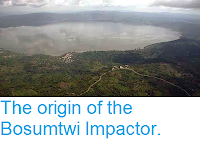Three hundred and twelve people, including about sixty children, have now been confirmed dead and it is thought that many more have yet to be found after a hillside collapse on the south slope of Sugar Loaf Mountain, to the south of Freetown, led to a river of mud washing through the town of Regent, on Monday 14 August 2017. The incident happened early in the morning, while many residents of the city were still sleeping, and has swept away hundreds of homes, many in informal settlements built illegally by migrants from the countryside in areas known to be prone to flooding. Several thousand people are thought to have been made homeless in the incident.
River of mud flowing through the town of Regent, Sierra Leone, following a hillside collapse on 14 August 2017. AFP.
The incident happened following days of heavy rains associated with the West African rainy season. Landslides are a
common problem after severe weather, as excess
pore water pressure can overcome cohesion in soil and sediments,
allowing them to flow like liquids. Approximately 90% of all landslides
are caused by heavy rainfall.
The approximate location of the 14 August 2017 Regent landslide. Google Maps.
West Africa has a distinct two season climatic cycle, with a cool dry
season during the northern winter when prevalent winds blow from the
Sahara to the northeast, and a warm rainy season during the northern
summer when prevalent winds blow from the Atlantic Ocean to the
southwest. These warm winds from the Atlantic are laden with moisture,
which can be lost rapidly when the air encounters cooler conditions,
such as when it is pushed up to higher altitudes by the mountains of the
Futa Jallon in Guinea.
Rainfall and prevalent winds during the West African dry and rainy seasons. Encyclopedia Britanica.
See also...
Follow Sciency Thoughts on Facebook.








